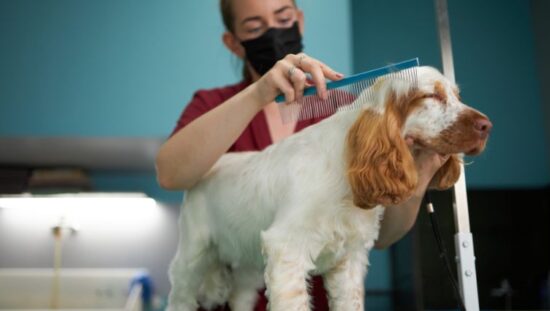Welcome to our guide on the best human foods for dogs! If you’ve ever wondered whether sharing your meals with your dog is safe, you’re not alone.
In this blog, we’ll help you discover what human foods are good for dogs. Learn about safe and healthy options to share with your furry friend, from vegetables to lean meats. Let’s dive into the delicious and dog-friendly world of human foods!

Benefits of Human Food for Dogs
Feeding your dog human food can be very beneficial. Here are some important nutritional benefits:
- Improved Digestion: Many vegetables and fruits, like carrots and apples, are high in fiber. This helps keep your dog’s digestive system running smoothly and can prevent constipation.
- Better Coat Health: Foods rich in omega-3 fatty acids, like fish, can make your dog’s coat shiny and healthy. These fats are great for skin health too, because they reduce itching and dryness.
- Increased Energy Levels: Lean meats, such as chicken and turkey, provide high-quality protein. This protein gives your dog the energy they need to run, play, and stay active.
Safe and Healthy Human Foods for Dogs
Feeding your dog the right human foods can be a great way to give them extra nutrients and keep them happy. It’s important to choose foods that are not only safe but also healthy for your dog. By adding these foods to their diet, you can help improve their overall health and well-being. Here are some healthy and safe human foods you can share with your dog:
I. Lean Meats
Lean meats are a great addition to your dog’s diet. They are full of protein, which helps your dog stay strong and active. Lean meats are also low in fat, which is good for keeping your dog at a healthy weight. Here are some healthy and safe lean meats you can share with your furry friend:
1. Chicken and Turkey
Chicken and turkey are excellent sources of lean protein for dogs. They are easy to digest and can help build strong muscles. Just make sure the meat is cooked and free of bones and seasoning. Plain, boiled chicken or turkey is tasty and healthy for your dog.
2. Fish
Fish, like salmon and sardines, are rich in omega-3 fatty acids. These healthy fats are great for your dog’s skin and coat, making it shiny and soft. Fish also helps brain health and can reduce inflammation. Always cook the fish and remove any small bones before giving it to your dog.
II. Vegetables
Vegetables are a fantastic addition to your dog’s diet. They are full of vitamins, minerals, and fiber, which help keep your dog healthy and their digestion smooth. Vegetables are also low in calories, which makes them a great snack for dogs who need to watch their weight. Here are some healthy and safe vegetables you can share with your furry friend:
1. Carrots
Carrots are crunchy and sweet, which makes them a favorite vegetable for many dogs. They are high in fiber and vitamin A, which is good for your dog’s eyes and immune system. You can give your dog raw or cooked carrots, just make sure they are cut into bite-sized pieces.
2. Green Beans
Green beans are a low-calorie treat that dogs love. They are full of vitamins and minerals, like vitamin C and magnesium, which help keep your dog healthy. You can give them raw, steamed, or cooked, but avoid canned green beans with added salt.
3. Sweet Potatoes
Sweet potatoes are a nutritious and tasty treat for dogs. They are rich in fiber, vitamins, and antioxidants, which are good for your dog’s digestion and overall health. Cook the sweet potatoes and serve them mashed or in small pieces, but avoid adding any seasoning.
III. Fruits
Fruits can be a delicious and healthy addition to your dog’s diet. They are full of vitamins, minerals, and antioxidants that are great for your dog’s overall health. Fruits are also a great natural source of fiber, which helps with digestion. However, it’s important not to exaggerate because of their natural sugars. Here are some safe and healthy fruits you can share with your dog:
1. Blueberries
Blueberries are small, sweet, and full of antioxidants. They are low in calories and high in vitamin C and fiber, making them a nutritious treat for your dog. You can feed blueberries fresh or frozen, but make sure they are cut into smaller pieces for easy chewing.
2. Apples
Apples are crunchy and refreshing, giving your dog vitamins A and C, as well as fiber. Take out the seeds and core before giving them to your dog, because these can be harmful. Sliced apples are a great snack, but don’t give your dog too many apples, because of their natural sugars.
3. Bananas
Bananas are a tasty and nutritious fruit for dogs. They are rich in potassium, fiber, and vitamins B6 and C. However, you need to be careful with bananas because they are high in natural sugars. You can serve them sliced or mashed, but peel them before giving them to your dog.
IV. Dairy
Dairy products can be a tasty addition to your dog’s diet, but they should be given in moderation and with caution. Some dogs are lactose intolerant, which means it’s difficult for them to digest dairy products. If your dog tolerates dairy well, it can provide protein and calcium, which are important for bone health. Choose plain and unsweetened types to avoid extra sugars and artificial ingredients. Here are a couple of dairy options for your furry friend:
1. Yogurt
Plain yogurt is a good source of probiotics, which can help support your dog’s digestive health. It’s important to choose yogurt that is free of added sugars and artificial sweeteners. Greek yogurt is often a good choice because it’s high in protein and lower in lactose compared to regular yogurt.
2. Milk
Some dogs can handle milk in small amounts, but others might get an upset stomach because of lactose intolerance. If you choose to give your dog milk, look for lactose-free or low-lactose options. It’s best to give them milk as an occasional treat, and not a regular part of their diet.
Always watch your dog for signs of stomach problems or allergies when trying new foods, including dairy.
Additional Foods Dogs Can Eat
1. Eggs
Eggs are a great source of protein for dogs. They have amino acids that help muscles grow and are easy for dogs to digest. Cooked eggs are safer than raw ones because raw eggs might have bacteria like salmonella.
2. Pumpkin
Pumpkin is low in calories and high in fiber, which is great for digestion. It can help with both diarrhea and constipation in dogs. Plain, cooked, and mashed pumpkin (not pumpkin pie filling) is safe for dogs to eat.
3. Oatmeal
Oatmeal is a healthy grain that gives dogs fiber and some minerals. It’s good for dogs with sensitive stomachs or wheat allergies. Cook plain oatmeal and avoid adding sugar, milk, or other toppings.
4. Coconut
Coconut in small amounts can be good for dogs. Coconut oil can make your dog’s skin and coat healthier and help with digestion. You can give them the white part of the coconut as a treat, but don’t give them coconut water or milk because they have a lot of potassium.
As you learn about safe human foods for your dog, it’s important to understand their appetite and health. If you’re worried about your dog’s eating habits, read our guide on Why Is My Dog Not Eating Food But Drinking Water? It’ll help you manage their diet and keep them healthy.
Foods to Avoid
It’s important to be aware of foods that are not safe for dogs to eat because they can be harmful or even toxic. Here are some foods to avoid giving to your dog:
- Chocolate: Contains substances called theobromine and caffeine, which can be toxic to dogs and cause vomiting, diarrhea, rapid breathing, and even seizures or death.
- Grapes and Raisins: Can cause kidney failure in some dogs, leading to vomiting, lethargy, and decreased appetite.
- Onions and Garlic: Can cause damage to red blood cells and lead to anemia, especially if consumed in large quantities or in concentrated forms like garlic powder.
- Avocado: Contains a substance called persin, which can cause vomiting and diarrhea in dogs.
- Xylitol: A sweetener often found in sugar-free gum, candies, and some baked goods. It can cause a dangerous drop in blood sugar (hypoglycemia) and liver damage in dogs.
- Alcohol: Can cause intoxication, vomiting, diarrhea, coordination problems, breathing difficulties, coma, and even death in dogs.
- Bones: Cooked bones can break into sharp pieces that might hurt your dog’s insides or block their gut.
- High-fat foods: Can cause pancreatitis, a painful and potentially life-threatening inflammation of the pancreas.
- Caffeine: Found in coffee, tea, and energy drinks, caffeine can cause similar symptoms as chocolate toxicity in dogs.
- Dairy Products (in lactose-intolerant dogs): As we mentioned above, many dogs have difficulty digesting lactose, which leads to stomach problems.
Tips for Introducing Human Foods
Here are some simple tips for introducing human foods to your dog:
- Take It Slow: Start by giving small amounts of new foods to see how your dog likes them and if their stomach handles them well.
- Pick Healthy Options: Choose foods that are good for dogs, like lean meats, veggies, and fruits. Avoid foods that are fatty, sugary, or have lots of additives.
- Cook Foods Well: Make sure meats are fully cooked, and remove any bones, skin, or fat that your dog shouldn’t eat. Wash fruits and veggies thoroughly.
- Control Portions: Give human foods as treats or snacks, not as their main meal. Too much of even healthy foods can upset their stomach or make them gain weight.
- Know What’s Dangerous: Keep harmful foods like chocolate, grapes, onions, and anything with xylitol (a sweetener) away from your dog.
- Ask Your Vet: If you’re unsure about food or your dog has special needs, check with your vet before giving it to them.
- Watch for Reactions: Look out for signs that your dog might be allergic or not handling a new food well, like itching, swelling, or stomach troubles.
- Use Food as Rewards: Use small pieces of human food to reward good behavior or during training sessions.
Conclusion
Adding human foods to your dog’s meals can be a nice way to give them extra nutrients and treats. Pick safe options like lean meats, veggies, and fruits to help keep them healthy. Introduce new foods slowly and watch for any problems. Avoid dangerous foods like chocolate and grapes. If you’re worried about what to feed your dog, ask your vet for advice. Sharing these foods can be a fun way to bond with your dog and make sure they stay strong and happy.



